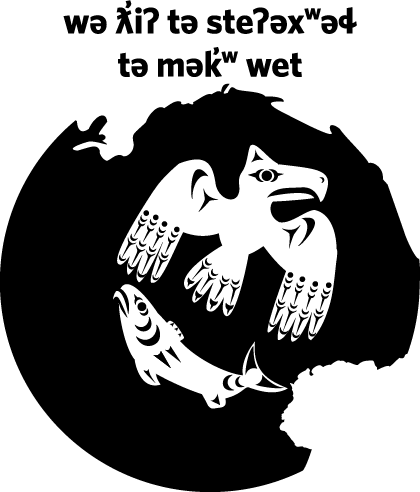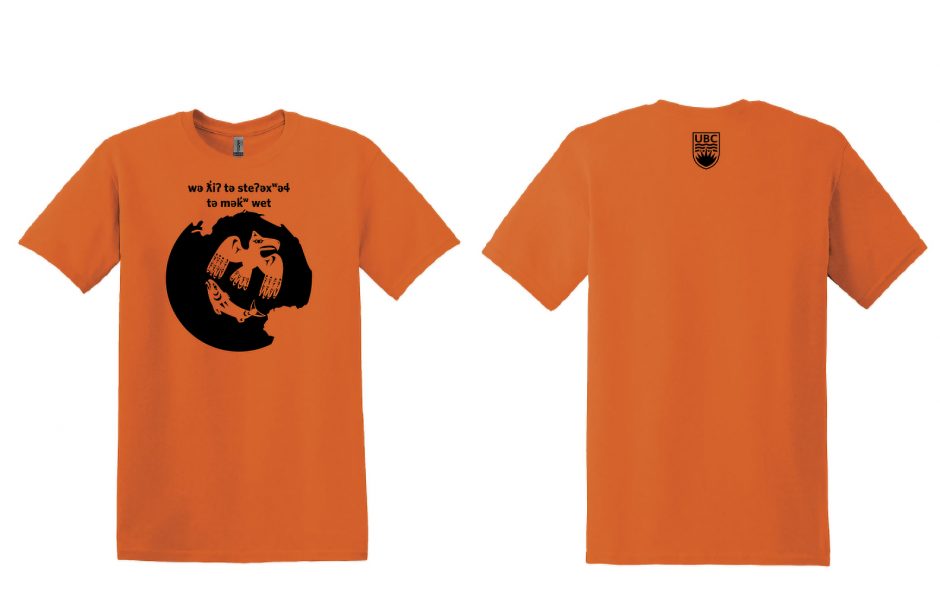Orange Shirt Day T-Shirt Design 2024
Each year, the Centre works with an Indigenous artist to create a unique Orange Shirt Day t-shirt design. This year’s shirts feature the work of xʷməθkʷəy̓əm (Musqueam) artist təlnaq̕ə (Alec Guerin).

Artist’s Statement
My ancestral name is təlnaq̕ə and my English name is Alec Guerin and I’m from Musqueam.
My relationship with art is a fickle one. I find it super important to my wellbeing that I creatively express myself, but it can also be a source of anxiety for me. I like to create in all forms. I consider myself a storyteller, first and foremost. But I also have spent a lot of time in the digital art world, and I also enjoy woodworking as well. Having the opportunity to throw myself into this design was super cathartic for me. It was important to me to create this piece to show to myself that it’s something that I could do, that Musqueam art was something that I could continue to incorporate into the ways I express myself.
The Orange Shirt Day design that I did for this year is really significant to me and my own personal journey. I’ve always kind of dabbled in doing work in Musqueam’s’ traditional style. But I’ve always shied away from it because I felt like I wasn’t good enough, or I didn’t know enough; which definitely can be linked to the traumas and the fallout of Residential Schools. So much of being an Indigenous person in the 21st century, from my perspective, is battling against those traumas, those pains and that shame that stems from the attempts to disconnect us from our culture and our ways of being. One of the ways that I really have experienced that is with our language as well as with our art.
The idea behind the design is representing how the impacts of colonization and Residential Schools is not a local issue or even a regional issue. It’s a global issue. A big piece of what Residential Schools tried to do was disconnect us from who we are and where we come from and that’s something that is still ongoing today. For example, a young Indigenous person is expected to go to a public high school. And that high school has a curriculum that’s interchangeable with basically any high school in the province. So, there isn’t that connection of contextualizing who you are and where you are in the world. I wanted to represent the importance of that by portraying the land as animals. And when I was having to prioritize how I was making that portrayal, I did end up having to pare it down to what I thought were the two most important parts. Which is the Musqueam and UBC relationship, so a Thunderbird and a fish. I asked, “what really makes a Thunderbird, what do you see in Musqueam designs about the salmon that are important to reflect?” and really spent time on each animal specifically before laying them out. I used a reference of the globe to add some negative space representing the other land masses.
Artist’s Bio
təlnaq̕ə, also known as Alec Guerin, is a multimedia artist and maker specializing in filmmaking, woodworking, tinkering, and aerial photography. With a background in digital art and a focus on visual effects and CGI, Alec explores themes of mental health, obsession, loss, and the power of community in his work.
Having studied Video Production at BCIT, which included immersive studies in software relevant to digital art, Alec possesses a strong foundation in the technical aspects of his craft. While primarily keeping his work personal, he has been recognized with an award from the Broadcast Educator’s Association of Canada for directing a factual television pilot.
Alec draws inspiration from the realms of language and cultural preservation and revitalization. He finds solace and purpose in practicing his ancestral culture as a form of medicine, embracing the notion that art can be a healing force. His aspiration is to not only learn and engage with the Musqueam art but also to contribute to the healing of personal and collective traumas through his creative expressions.
As Alec embarks on this profound artistic journey, he hopes to find the courage to share his work with the community in a good way. By doing so, he seeks to support and promote the accessibility of Musqueam culture, including art.
Shirts with the new design will be available for sale at the UBC Bookstore and the MOA online shop by September 1, 2023. Profits from the sales will be donated to the Orange Shirt Society and the Indian Residential School Survivor Society.

“When you wear an orange shirt it’s like a little bit of justice for us Survivors in our lifetime, and recognition of a system we can never allow again.”
—Phyllis Webstad